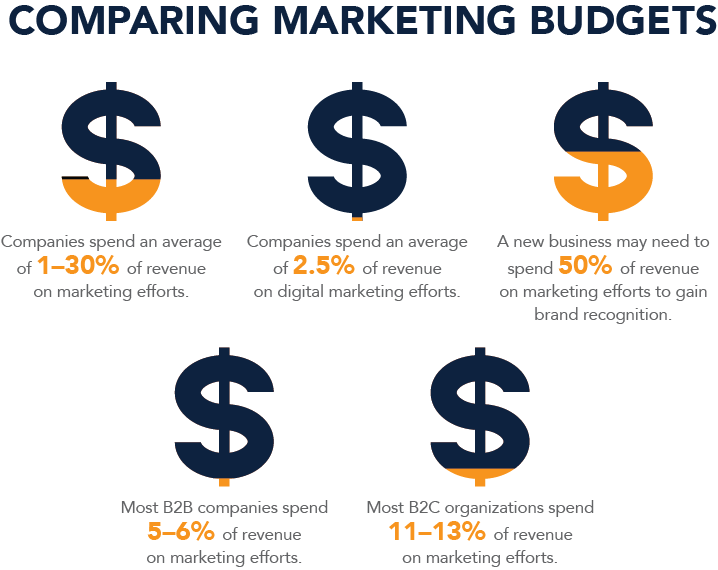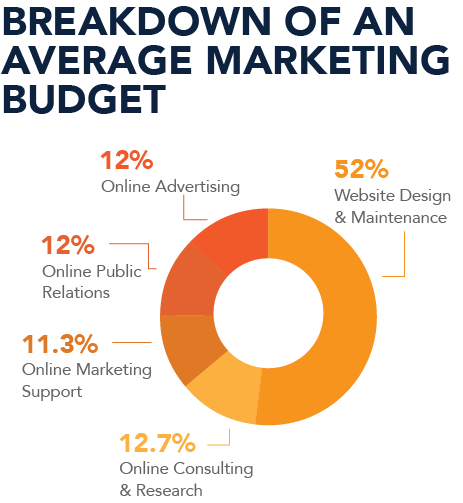How much should you budget for marketing?
Elevate Your Work
How many times have you heard in your life that you need to make a budget and stick with it? While we probably all agree that this is wise advice, it can be difficult to follow—especially when running a business or nonprofit organization. However, developing a budget can ensure that you not only stay within the parameters of profit and loss goals, but also that you take the time to think through what it is that you want to accomplish—and how best to get there.
The General Budget: Setting aside enough funds
When deciding how much that your organization should spend on marketing, plan for a two-step beginning. First, you’ll need to take the time to develop an overall amount that you can (and should) spend. Next, break that number down into a budget of where you want to allocate those funds. Thankfully, this process is not a shot in the dark—there’s plenty of research, from both industry experts and competitive analysis—to help guide you through what you should be spending and where you should spend it.
- In general, companies spend between 1-30% of revenue on marketing.
- If separated, a digital marketing budget (i.e., the funds allocated specifically to social media, website development, email marketing and/or online ads) is usually 2.5% of revenue.
- In B2B firms (business-to-business; i.e. companies marketing to other companies), most companies spend 5-6% of revenue on marketing.
- In B2C organizations (business-to-consumer; or companies marketing to the general public), most companies spend 11-13% of revenue on marketing.
- A new business may need to spend as much as 50% of its revenue on marketing in the first year in order to gain name recognition.
- Smaller businesses in niche markets may get by only matching their competitors’ spending habits.

Allocating Marketing Funds: The breakdown
Once you have a general idea of how much to spend overall, you need to break it down into where to spend it.
Marketing budgets should include branding, advertising, public relations, promotions, and all digital communications.
To be specific, this means a marketing budget may include:
- Developing and hosting a website
- Website content updates
- Print projects, such as brochures, sales sheets, and case studies
- Direct mail, including postcards, targeted letters, etc.
- Print and/or broadcast advertising
- Corporate identity packages, including business cards, stationery, and promotional items
- Email marketing
- Social media management
- Search Engine Optimization (SEO) and other forms of online research
- Online advertising, such as Google AdWords or Facebook ads
- Video production
- Trade shows
- Public relations
- Any other marketing materials related to your specific business goals
Digital Marketing: Where online should your money go?
Traditionally, digital (or online) marketing is less expensive than print or traditional advertising. Therefore, companies with tight budgets, especially small businesses, will often try to reap the most benefit out of online marketing. But don’t be fooled into thinking that a little bit of cash will go a very long way, even online. All marketing efforts, digital or print, need to be properly funded in order to succeed.
Typically, businesses with fewer than 50 employees budget only $500/year for online marketing, which usually encompasses just website maintenance and email marketing. In contrast, companies with more than 50 employees budget closer to $63,000/year, which allows them to include SEO, social media, video production, and online public relations. This incredible gap in spending means that smaller companies that are able to allocate larger budgets will stand a higher chance of separating from their competition and competing at a higher level.
For small businesses with a budget beyond that $500/year, an overall annual budget tends to break down this way:

Data culled from this 2012 report.
- Website maintenance, which includes website design, content for new pages, updates, technical maintenance, and hosting, accounts for about half (52%) of all spending
- Online public relations, which includes publishing news articles, managing social media accounts, and handling customers and the media online, accounts for 12% of spending
- Online marketing support, which may include social media campaigns, as well as other online or email marketing efforts, is 11.3% of spending
- Online ad production and online consulting/research, which includes research for SEO, managing Google and Facebook ads, and researching and implementing online ad placement, each account for about 12% of spending
At A-LINE, we’ve worked with organizations large and small to meet their marketing needs within their budgets. That said, we also know that to truly succeed in marketing, you have to be willing to allocate appropriate funds. Spending all your money on a website but saving none to run supporting efforts such as social media, email marketing, or online advertising may leave you without the success that you envisioned. Similarly, running a great social media campaign that links to dull webpages also may fall short. In fact, just like in our personal lives, a good budget takes a lot of balance!
A-LINE is happy to work with clients to find that perfect balance where money and quality marketing efforts match. Contact us today to make an investment in the marketing plan that best suits your organization and its needs.
Want more tools to calculate your marketing budget? Check out these sites.
If your company sells products directly to consumers and spends quite a bit of money on rent—so that a nice storefront itself becomes part of your marketing—you may prefer to follow this calculator to find an exact percentage of revenue to spend on marketing.
If you’re still having trouble determining an overall marketing budget, this step-by-step guide can help you calculate that final number.
Research collected from these sites:
http://www.rickwhittington.com/blog/small-businesses-web-marketing-spending/#sthash.y4pJcst3.dpuf
http://www.gartner.com/technology/research/digital-marketing/digital-marketing-spend-report.jsp
https://www.legalzoom.com/articles/cost-of-marketing-what-is-the-average-budget
https://www.borrellassociates.com/industry-papers/papers/what-smbs-spend-on-digital-marketing-services-detail
